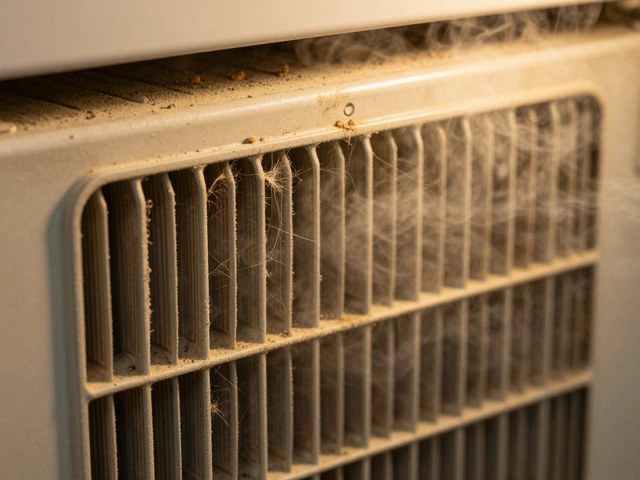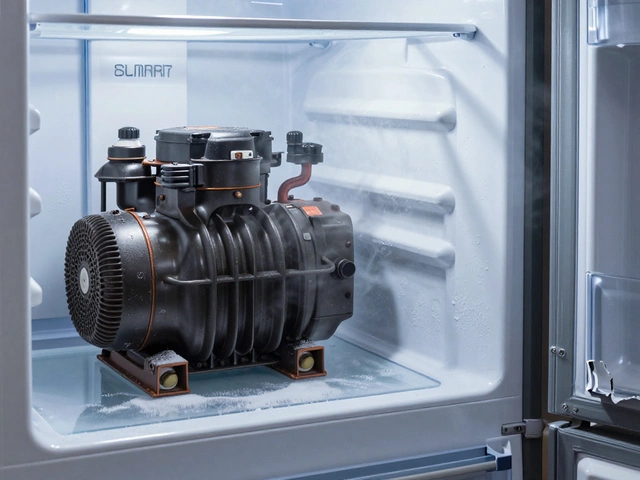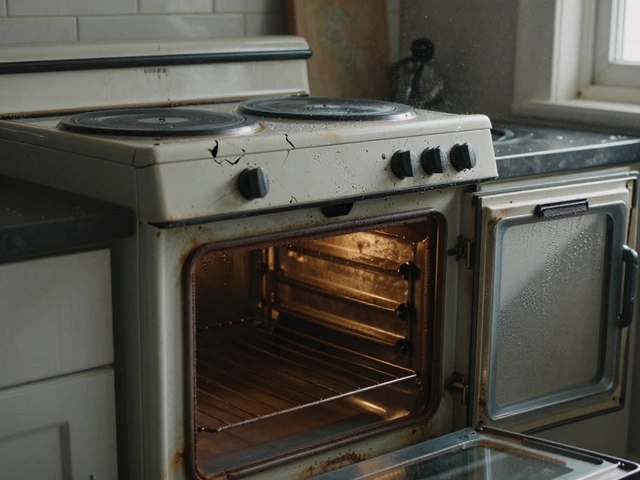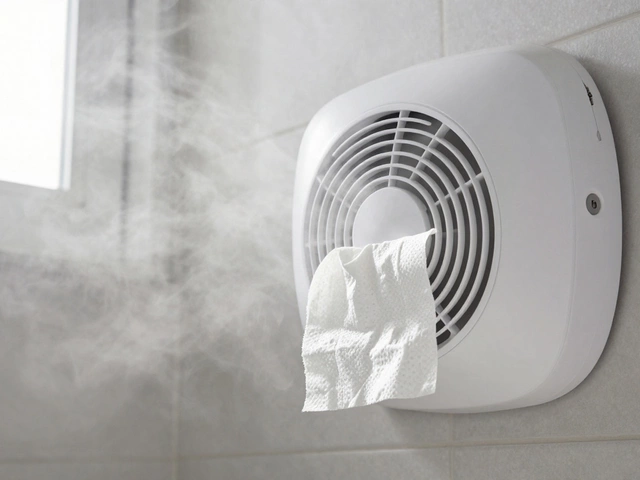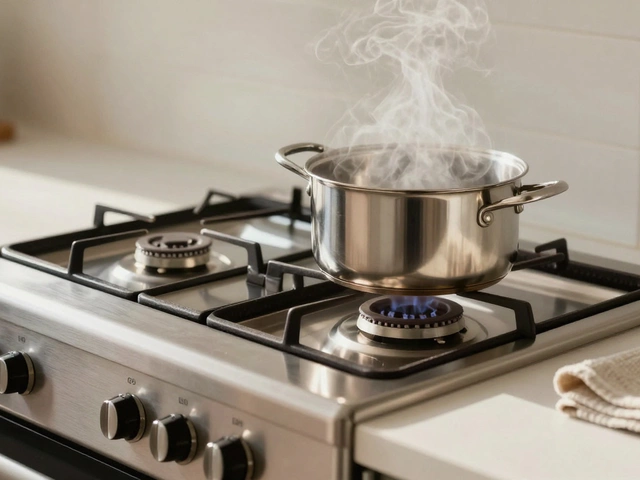Microwaves have become indispensable in modern kitchens, providing quick and convenient meal options for busy households. Yet, when they start to malfunction, it can feel like a recipe for disaster. The big question often looming is whether it's worth repairing or if replacement is the wiser choice.
Making the right decision involves weighing several factors such as the age of the appliance, the nature of the problem, and the costs involved. While some issues can be fixed with a mere twist of a screwdriver, others might require a professional touch—or a trip to the store for a new model.
- Signs Your Microwave Needs Attention
- The Cost Factor: To Repair or Replace?
- Troubleshooting Common Microwave Issues
- When to Call a Professional
- Extending the Lifespan of Your Microwave
Signs Your Microwave Needs Attention
Microwaves are silent warriors in the kitchen, tirelessly working away until one day they don't. How can you tell when your trusty microwave is trying to tell you it needs help? A few tell-tale signs can signal that it's time to either roll up your sleeves for some microwave repair or to start researching new models. One common indicator is a lack of heat. If your microwave is operating as usual but your food remains frustratingly cold, it's likely an issue with the magnetron, the component responsible for creating microwaves. This piece can be replaced, but if your microwave is old, it may be more cost-effective to upgrade to a newer model since this is one of the pricier repairs.
Another red flag is unusual noises. Microwaves naturally emit a gentle hum while performing their magic, but screeching, grinding, or rattling means something is amiss. A damaged turntable or internal parts knocking against each other could be the culprit. These sounds often predict future failures, so attention is needed sooner rather than later. Broken buttons or a faulty display are also common issues. If you find yourself pushing buttons in vain and the display is showing cryptic messages, the control panel may need an intervention. This can range from a simple cleaning to a soldering fix for those inclined to dabble in electronics or be a sign of a deeper electrical failure requiring more extensive work.
A stitch in time saves nine. Maintaining and repairing instead of instantly replacing can extend the life of appliances, proving more cost-efficient in the long run.
Finally, if there's a burning smell during operation that isn’t emanating from your popcorn, there's a genuine issue. This indicates faulty wiring or a damaged component that could, at worst, pose a fire hazard, and you should address it quickly. Safety should always take precedence, so unplug the microwave until a professional can examine it. Conducting an occasional check-up helps prevent escalation into dangerous territory and keeps everything working optimally.
Check Your Microwave Regularly
Regular maintenance is key to heading off major repairs. Wipe down the interior frequently, especially after food splatters, as leftover food can damage components or create foul odors. Routine cleaning may seem mundane but doubles as a performance and hygiene booster. Monitor how your microwave sounds and works; subtle changes can alert you to problems before they escalate. Become familiar with the manual and troubleshooting guide that accompanies most appliances. These can be invaluable resources offering simple solutions to common hiccups without needing expert intervention. Simple steps like these can significantly prolong the usability of this trusty kitchen companion.
The Cost Factor: To Repair or Replace?
Deciding whether to repair or replace a microwave is a question that sparks many kitchen table debates. The answer often depends on a variety of factors, starting with the financial implications. New microwaves can range significantly in price, from budget-friendly models under a hundred bucks to high-end appliances that can set you back several hundred dollars. Here, it's important to weigh the cost of repair against the price of a new microwave. Typically, if the repair costs exceed half the price of a new unit, replacement might be the better financial decision. But let's dive deeper, because the numbers aren't the only players in this game of decisions.
Another important element to consider is the age of the microwave. According to Consumer Reports, the average lifespan of a microwave is approximately nine years. If yours is nearing this age, investing in a repair might be akin to affixing a band-aid when major surgery is required. Often, the money spent on frequent repairs could be better allocated toward a new purchase, which will arrive with new features, added reliability, and the peace of mind that comes with a warranty. Machines naturally become more prone to breakdowns as they age, and an aging microwave might not just be inefficient but could also edge on unsafe.
Microwave repair costs themselves can also vary wildly. Fixing minor issues like a faulty door latch or replacing a fuse can be quite affordable, while more serious defects, such as a broken magnetron—the heart and soul of a microwave's heating capabilities—can lead to spiralling costs, often anywhere from $100 to $250. Professional labor can add significantly to the bill, often making it less cost-effective for older, less expensive models. It's paramount that you get a trusted estimate before committing to repairs, ensuring no hidden fees pop up, leading to unwelcome surprises.
"An ounce of prevention is worth a pound of cure," Benjamin Franklin once said.
This reminds us that sometimes anticipating when to replace an appliance can save not just money, but also the time and hassle of dealing with one that keeps breaking down. Like careful culinary preparation, contemplating these costs early, before your microwave inevitably succumbs to age or overuse, you'll savor the dish of financial foresight.
Comparing prices and weighing them against your microwave's age and current condition will guide you to the most sound decision. With some prior research, including checking local appliance stores and online marketplaces for the best deals, you can ensure you're making an informed choice. After all, your microwave is not just a tool—it’s an ally in your daily culinary conversations, and whether to repair or replace it deserves thoughtful consideration.
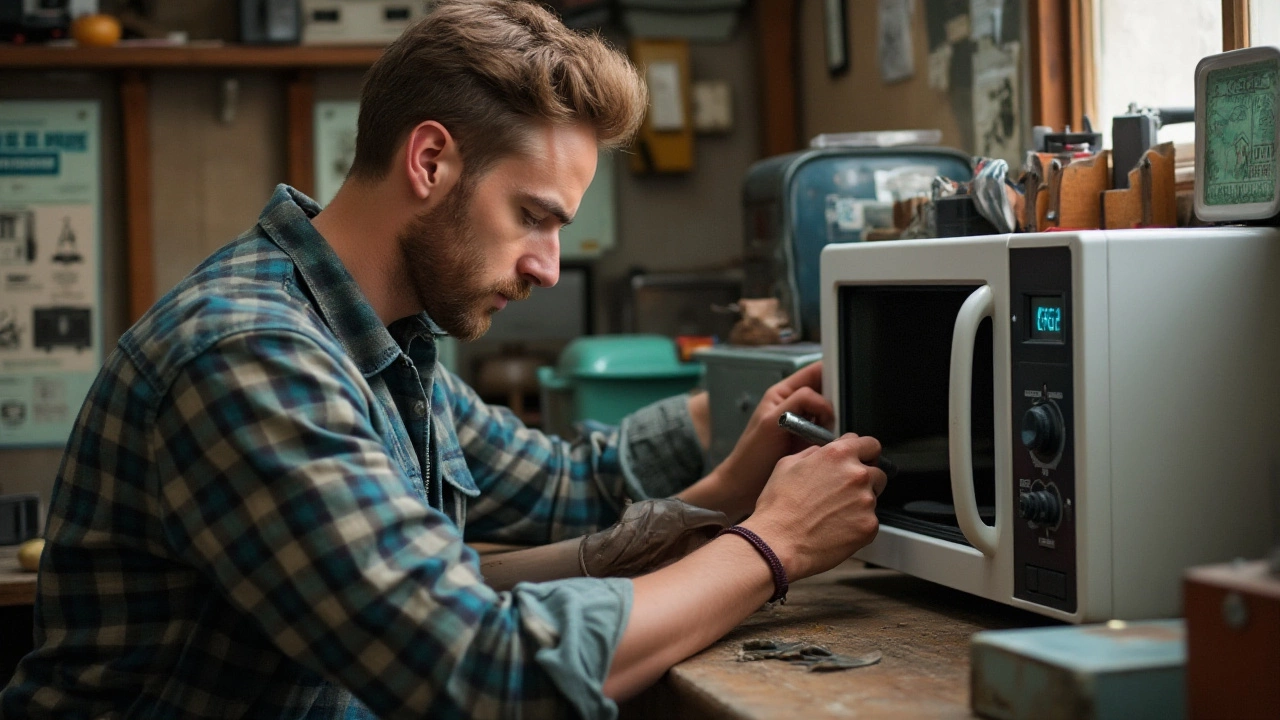
Troubleshooting Common Microwave Issues
Microwaves are remarkable machines that turn cold leftovers into hot meals within minutes. But when they start acting up, even simple tasks can become frustrating. The good news is, many common problems can be resolved with a bit of troubleshooting know-how. Let's delve into these issues and how you might address them before considering a costly microwave repair or replacement.
One frequent issue users encounter is the microwave not heating food properly. This lack of heating can stem from something as simple as a faulty door switch. Microwaves use these switches as a safety feature, ensuring the device only operates when the door is securely closed. Inspecting the door and making sure it latches properly could sometimes fix the issue. In cases where the door seems fine, internal fuses might be the culprit, especially if the microwave abruptly stops and doesn't turn back on. Checking the fuses, ensuring they're intact, and replacing them if blown can often solve the problem.
Another common headache is the turntable not spinning, which can lead to uneven cooking. Often, this is due to the roller guide or the turntable coupling being misaligned or damaged. Simple realignment or replacement of these internal parts can restore the microwave's functionality. Sometimes, cleaning stuck-on food remnants that might block the components can do wonders. If these don't help, the motor driving the turntable might need attention from a professional. According to a report by Consumer Reports, "Many microwaves can be fixed with a few hours and basic tools if users take the time to understand the problem."
Strange noises during operation are another tell-tale sign something isn't right. These noises can range from annoying rattles to worrying screeches. The cause is often food debris caught in the turntable mechanism or an item placed incorrectly. Removing the object, cleaning up the mess, and verifying everything is in its rightful place can be the simplest solution. However, grinding noises could indicate issues with the fan blades or the magnetron, which might need more extensive investigation or expert help.
Lastly, power problems can leave you scratching your head. If the microwave isn't powering on at all, starting with the basics is essential. Checking that it is securely plugged in and the outlet is functioning can quickly rule out simple solutions. Tripping a circuit breaker may sometimes occur if too many devices are on the same circuit. For a more in-depth diagnosis, examining the electrical cords for any damage could reveal fault lines causing the power issues. In any scenario where cord damage is discovered, it’s prudent to contact a qualified technician for assistance.
When to Call a Professional
Knowing when to call in a professional can save both time and money, not to mention the frustration of a DIY project gone wrong. A malfunctioning microwave might tempt you to grab a toolkit, but sometimes stepping aside for an expert to take over is the smarter route. One big clue is if your microwave has stopped heating food entirely. The culprit could be anything from a blown fuse to more serious issues like a faulty magnetron or capacitor. These components are not only difficult to access, but they also store high-voltage electricity that can be dangerous if handled improperly.
If you notice smoke, burning smells, or odd noises coming from your microwave during operation, these are moments where professional intervention becomes necessary. An unusual sound could be something simple like a motor issue or something complex that could risk further damage if misdiagnosed. It's not just about fixing the immediate problem; it's about ensuring your appliance remains in good working order and safe to use.
"While most home appliances can be managed and maintained by the homeowner, microwaves pose a larger threat due to their electrical components. Trust a licensed technician to ensure your safety and the proper functioning of your microwave," advises Dana Blackwell, an appliance safety expert.
Understanding the cost of repair versus replacement is also key. If you're facing repair costs that inch closer to the price of a new unit, it might be time to rethink the fixing strategy. Check the manufacturer's warranty first. In the case that your microwave is still under warranty, you might qualify for a covered repair. However, if it's past its prime—say more than ten years old—replace it instead. Not only have repair parts become obsolete, but upgraded energy efficiency in newer models could eventually save you on electricity bills.
In some regions, electric benchmarks demand specific certifications for microwave repairs. Ensure the person you're hiring not only comes recommended but is also certified to handle such devices. Finding a reputable repair service involves more than flipping through listings. Look into reviews, get quotes from various services, and verify certifications to ensure that your home and appliance are in safe hands. Experts bring insight and tools that a layperson simply doesn't possess, and their attention to detail can pinpoint issues otherwise missed.
To wrap it up, recognizing when it's time to move from personal hands-on troubleshooting to expert care is crucial. By doing so, you ensure your microwave continues to run safely and efficiently, allowing your kitchen experience to remain seamless and stress-free. Embrace the support of professionals who can manage the complexities and nuances of these convenient yet intricate appliances.
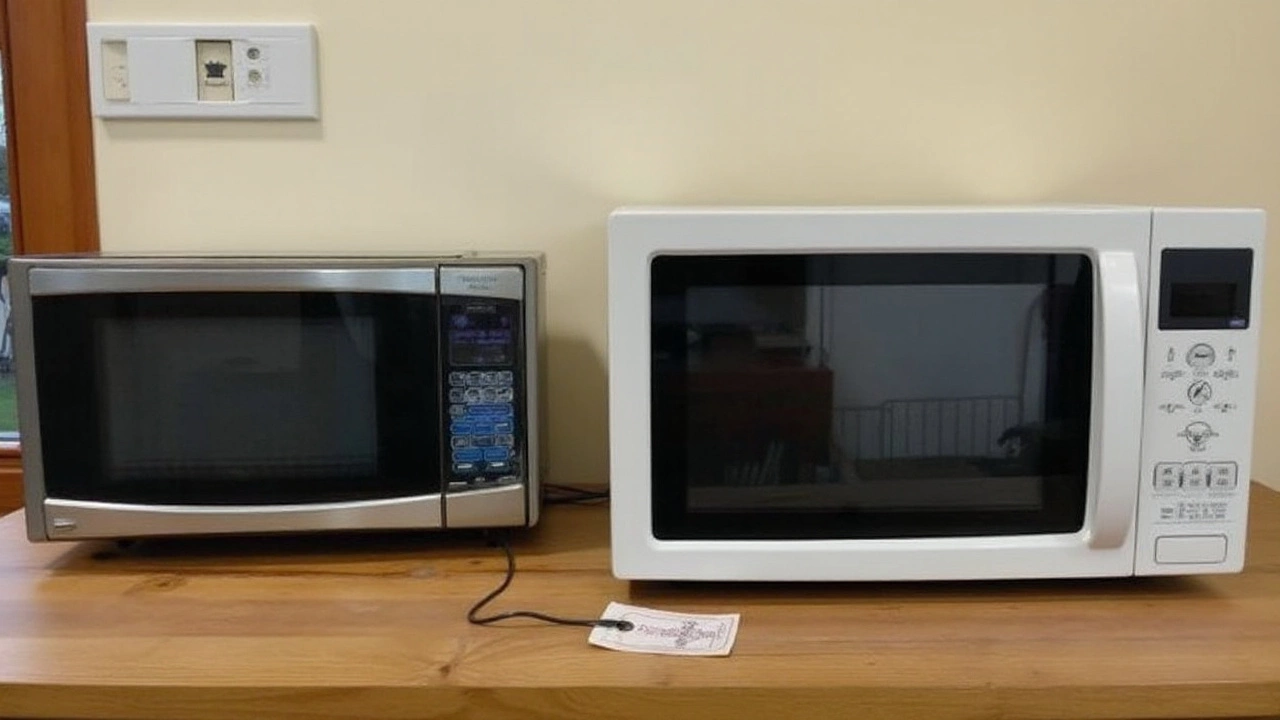
Extending the Lifespan of Your Microwave
Keeping your microwave in tip-top shape not only saves you money but also keeps your kitchen running smoothly. Many people underestimate the impact of routine appliance maintenance, but by following a few essential steps, you can significantly increase years of reliable service from your microwave. One crucial aspect is consistent cleaning. Food particles and spills can get trapped inside, which could lead to inefficient operation or even sparking. Make it a habit to wipe the interior with a damp cloth after use, particularly if there are spills.
Proper placement plays a pivotal role in the health of your microwave. Ensure that it sits on a stable surface with adequate ventilation. Microwaves release heat during operation, and if not properly ventilated, this can lead to overheating and premature failure of components. Check the air vents regularly to make sure they are not obstructed by debris or dust. Positioning appliances too close to walls or other appliances might hinder airflow, so keeping a gap can make all the difference.
Sometimes, despite our best efforts at fixing microwave issues, replacements of certain parts are necessary. Inspect the door seals occasionally; a compromised seal could let microwave energy leak, reducing efficiency. You might notice your microwave taking longer to heat food, which could be a sign that the seals need attention. Replacing faulty seals promptly can keep things running smoothly and help avoid energy wastage.
Turntable and Other Parts
Another part that often gets overlooked is the turntable. It's essential for uniform cooking, so check for cracks or chips that could affect rotation. A damaged turntable can usually be replaced quite affordably. Sometimes, examining small parts like the roller ring and the coupler, which sit beneath the turntable, can reveal hidden issues affecting performance. Ensuring these components are clean and in good condition can make a difference.
Electrical surges are also something to be wary of. Consider using a surge protector. This inexpensive device can fend off fluctuations in electricity that might otherwise harm your microwave. It's a small investment with a big payoff in terms of extending that lifespan you’re aiming for.
"Investing in simple maintenance for your home appliances can lead to years of trouble-free use," says home appliance expert, Sarah Thompson.
Maintenance Schedule
Creating a maintenance schedule doesn't have to be complicated. Set reminders on your calendar for regular checks. Sometimes, you might overlook something as simple as the microwave light, which rarely affects function but certainly improves usability. Replace any malfunctioning bulbs to keep things clear and safe, particularly when cooking at night. Keeping a checklist can aid consistency and prevent forgetfulness.
By taking these actionable steps, you're not just saving yourself the headache of sudden breakdowns, but you're also actively managing your kitchen assets. It’s these small actions that lead to long-term satisfaction and performance from hard-working appliances like the microwave. By regularly applying these tips, you're sure to enjoy many happy years of effortless food preparation. It's all about small adjustments leading to sustainable results in the long run.

